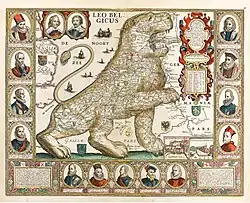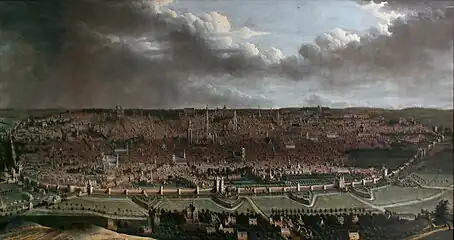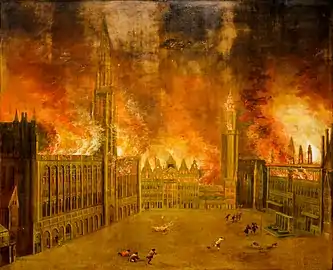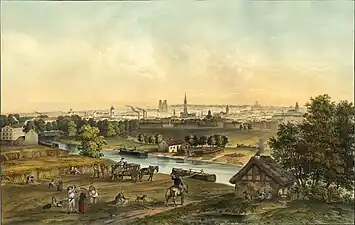| History of Belgium |
|---|
 |
|
Timeline • Military • Jewish history • LGBT |
The following is a timeline of the history of Brussels, Belgium.
Prehistory
- 3000–2200 BCE – First known settlements in Brussels during the Neolithic era, located in the Sonian Forest.[1]
Roman Period
- 1st century CE – A Roman villa is constructed in Anderlecht, located near today's Allée de la Villa Romaine/Romeinse-Villadreef.[2]
- 2nd century CE – A Gallo-Roman villa is constructed in Jette, located in today's King Baudouin Park.[3]
Middle Ages
- 580 – Saint Gaugericus builds a chapel on an island in the river Senne, laying the origin of the settlement which was to become Brussels.[4]

Charles of Lorraine founded what would become Brussels, c. 979.
- 979 – Charles, Duke of Lower Lorraine, transfers the relics of Saint Gudula to the chapel built by Saint Gaugericus, marking the city's official founding.
- 1012 – Saint Guy dies in Anderlecht on his return home from a pilgrimage to Jerusalem.[5]
- 1015–1020 – Oldest written record of the city by Olbert of Gembloux.[6]
- 1229 – Henry I, Duke of Brabant, issues a charter of rights for the city.[7]
- 1273 – The first stage of the Church of St Michael and St Gudula's rebuilding in the Gothic style is completed (approximate date).[8]
- 1304 – The Church of Our Blessed Lady of the Sablon is founded.[9]
- 1308 – The Meyboom is first attested.[10]
- 1348 – The Ommegang begins as a Marian procession.[11]
- 1356
- The Joyous Entry of Joanna and Wenceslaus into the city takes place.
- The expansion of the city's fortifications begins.
- 1370 – The Brussels massacre occurs, followed by the expulsion of the city's remaining Jewish population.
- 1381 – The Halle Gate is built.
- 1420 – The Town Hall is built.
- 1455 – The Chapel of the Blessed Sacrament of the Miracle is built.
- 1476 – The first printing press is in operation in the city.[12]
- 1477 – The Habsburgs come to power in the Burgundian Netherlands, with Brussels as their capital.[13]
16th and 17th centuries
- 1536 – The King's House is built at the Grand-Place/Grote Markt for the Duke of Brabant.[14]
- 1555 – Charles V, Holy Roman Emperor, abdicates in the Aula Magna of the Palace of Coudenberg.
- 1561 – The city's port and the Willebroek Canal are opened.[15]
- 1568 – The Counts of Egmont and Horn are executed at the Grand-Place.
- 1579–1585 – Calvinist Republic of Brussels
- 1585 – 10 March: Spain recaptures the city, then the capital of Spanish Netherlands, after a siege by the Duke of Parma.[16][17]
- 1619 – The original Manneken Pis statue is installed.
- 1622 – The funeral of Albert VII of Austria takes place.
- 1695 – The city is bombarded by the French, destroying a third of its buildings, including the Grand-Place.
- 1700 – The first Theatre of La Monnaie, then spelled La Monnoye, is built.

Brussels in the 17th century

Ommegang of Brussels in 1615

The Grand-Place/Grote Markt in flames during the bombardment of Brussels in 1695
18th century
- 1713 – The city becomes part of the Austrian Netherlands.
- 1714 – The Belfry collapses.
- 1719 – François Anneessens is executed at the Grand-Place.
- 1731 – The Palace of Coudenberg is destroyed by fire.
- 1746 – The city is besieged and captured by the French.
- 1772
- The Imperial and Royal Academy is established.[18]
- The Opéra flamand is established.
- 1774 – The Rue Royale/Koningsstraat is laid out.[9]
- 1775 – Brussels Park is laid out.
- 1782 – The Place Royale/Koningsplein is laid out.
- 1787 – The Vauxhall opens.
- 1783 – The Royal Palace's construction begins.
- 1784 – The city's gates are demolished, except for the Halle Gate.
- 1787 – The Church of St. James on Coudenberg is consecrated.
- 1789 – The Brabant Revolution reaches the city and makes the Austrian authorities flee.
- 1790 – December: The Austrians take the city back and pledge to reverse the reforms of Joseph II, Holy Roman Emperor.
- 1795 – The French rule begins; the city becomes part of the department of the Dyle.
- 1796
- La Cambre Abbey and Forest Abbey are abolished.
- The Church of St. Gaugericus is demolished.
19th century
- 1803 – The Museum of Fine Arts opens.[19]
- 1815
- The Duchess of Richmond's ball takes place.
- The city becomes the joint capital of the United Kingdom of the Netherlands.
- 1819 – The new opera theatre is inaugurated.
- 1822 – The Société Générale de Belgique is headquartered in the city.[20]
- 1826 – The Botanical Garden is founded.

Episode of the Belgian Revolution of 1830, Gustaf Wappers, 1834
- 1830
- The Belgian Revolution starts in the city.[21]
- The city becomes the capital of Kingdom of Belgium.[13]
- Population: 98,279 city; 120,981 metro.[22]
- 1832
- The Royal Conservatory is founded.
- The Brussels–Charleroi Canal is completed.
- 1834 – The Free University is founded
- 1835 – The Groendreef/Allée Verte railway station, Belgium's first, is inaugurated.
- 1846
- The Royal Belgian Institute of Natural Sciences is founded.
- Population: 123,874.[23]
- 1847
- The Avenue Louise/Louizalaan is commissioned.
- The Royal Saint-Hubert Galleries open.
- 1848 – The International Peace Congress is held in the city.
- 1850 – Population: 142,289 city; 222,424 metro.[22]

- 1855 – The Brussels-Luxembourg railway station is built.
- 1856 – The reconstructed Royal Theatre of La Monnaie opens.
- 1859 – The Congress Column is erected.
- 1860 – Population: 185,982 city; 300,341 metro.[22]
- 1861 – The Bois de la Cambre/Ter Kamerenbos is laid out.
- 1869 – Trams begin operating in the city.
- 1871
- The covering of the Senne takes place; the Central Boulevards are laid out.
- The Banque de Bruxelles is established.[20]
- 1873 – The new building for the Brussels Stock Exchange is completed.
- 1877 – Ixelles Cemetery is created.
- 1880
- The Cinquantenaire/Jubelpark is created.
- The White slave trade affair scandal is exposed and attracts international attention.
- 1881 – L'Echo newspaper begins its publication.[24]
- 1883 – The Palace of Justice is inaugurated.
- 1885
- Saint Mary's Royal Church is built.
- Population: 171,751.[23]
- 1887
- Le Soir newspaper begins its publication.[24]
- The Palace for Fine Arts is built.
- 1888 – Het Laatste Nieuws newspaper begins its publication.[24]
- 1889 – November: The Brussels Anti-Slavery Conference 1889–90 begins.
- 1890 – The Abattoirs of Anderlecht enter service as a central abattoir for the whole city.
- 1891 – August: The International Socialist Labor Congress is held in the city.
- 1893
- The Paris–Brussels cycle race begins.[25]
- The Hôtel Tassel is built.
- The Hankar House is built.
- 1894 – The Société Belge d'Études Coloniales is headquartered in the city.
- 1895
- The Royal Greenhouses of Laeken are built.
- The Hotel Métropole opens at the Place de Brouckère/De Brouckèreplein.
- 1896 – The King's House is rebuilt in the neo-Gothic style.
- 1897
- The Brussels International world's fair is held.
- The Avenue de Tervueren/Tervurenlaan is laid out.
- 1899 – The Maison du Peuple/Volkshuis is built.
- 1900
20th century

- 1901 – The Maison & Atelier Horta is built.
- 1905
- The Cauchie House is built.
- The Cinquantenaire's memorial arch is completed.
- 1908 – The Chapel of the Resurrection is built.
- 1910 – The Brussels International world's fair is held.

The 1911 Solvay Conference in Brussels was the first world physics conference.
- 1911
- The first Solvay Conference is held.
- The Stoclet Palace is built.
- 1914 – World War I: The city is captured and occupied by the German Army.
- 1917 – The Constant Vanden Stock Stadium opens.
- 1919
- The Lignes Farman airline begins operating its Paris–Brussels route.[27]
- Population: 685,268 metro.[28]
- 1920 – The Oscar Bossaert Stadium opens.
- 1921 – Haren, Laeken and Neder-Over-Heembeek are merged into the City of Brussels.
- 1922 – The Société du Palais des Beaux-Arts and the Jardin botanique Jean Massart[29] are established.
- 1923 – The Royal Museum of the Armed Forces and Military History opens.
- 1927 – The fifth Solvay Conference, perhaps the most famous, is held.
- 1930 – The Jubilee Stadium opens.
- 1931 – The Brussels Symphony Orchestra is founded.
- 1934 – The Villa Empain is built.
- 1935
- The Brussels International world's fair is held; the Palais des Expositions is built.
- The Basilica of the Sacred Heart is consecrated.
- The city co-hosts the 1935 European Wrestling Championships.
- 1937 – The Queen Elisabeth Competition begins.
- 1939 – The Constantin Meunier Museum opens.
- 1940
- World War II: The German occupation begins.
- The German Military Administration in Belgium and Northern France is headquartered in the city.
- July: The Frontstalag 110 prisoner-of-war camp is established by the Germans.[30]
- 1941 – The Frontstalag 110 POW camp is dissolved.[30]

Scenes of jubilation as British troops liberate Brussels, 4 September 1944
- 1944
- 3–4 September: The city is liberated by the Welsh Guards; the Palace of Justice is burnt by the Germans to destroy legal records during their retreat.
- 8 September: The Belgian government in exile returns to the city after four years in London.
- The District of Brussels, formed by Nazi Germany, is no longer in control of the territory.
- 1948
- The Treaty of Brussels, founding the Western Union (WU), is signed.
- Brussels Airport opens.
- 1950 – The city hosts the 1950 European Athletics Championships.
- 1952 – The North–South connection is completed; Brussels Central Station and Brussels-South railway station open.
- 1953 – The city hosts the 1953 World Fencing Championships.
- 1958
- Expo 58 world's fair is held; the Atomium is built.
- The city becomes one of the seats of the European Community.
- 1960 – The city hosts the Congolese Round Table Conference.
- 1967
- The À L'Innovation department store is destroyed by fire.
- NATO's headquarters are established in the city.
- 1969 – The Free University splits along linguistic lines into the Université libre de Bruxelles (ULB) and Vrije Universiteit Brussel (VUB).
- 1971
- The Brussels Agglomeration is created.[31]
- The Flower carpet at the Grand-Place begins.
- 1972 – The city hosts the 1972 European Karate Championships.
- 1974 – The Brussels Independent Film Festival begins.
- 1975
- Bank Brussels Lambert is headquartered in the city.
- The Université catholique de Louvain's Jardin des plantes médicinales Paul Moens is established.
- 1976 – The Brussels Metro begins operating.
- 1978
- The Brussels Ring is constructed.
- The RTBF Symphony Orchestra is formed.[32]
- 1979
- May: The city hosts the 1979 European Judo Championships.
- The Archives of the City of Brussels moves into the former Magasins Waucquez.[33]
- 1980
- The Flemish Community and the French Community of Belgium each designate Brussels as their capital city.
- Population of the Brussels-Capital Region: 1,008,715.[34]
- 1985
- Pope John Paul II visits the city.[35]
- 29 May: The Heysel Stadium disaster takes place.[35]
- 1988 – Kinepolis Brussels opens.
- 1989
- Brussels-Capital Region is formed; the Parliament of the Brussels-Capital Region[36] and Minister-President of the Brussels-Capital Region are established.
- The Belgian Comic Strip Center opens.
- Mini-Europe opens.
- 1990 – Population of the Brussels-Capital Region: 964,385.[34]
- 1993 – The Espace Léopold opens.
- 1994
- The City of Brussels is designated capital of Belgium and seat of the Federal Government.[37]
- Freddy Thielemans becomes mayor.[38]
- 1995
- The Erasmus Brussels University of Applied Sciences and Arts is established after a merger of some ten colleges in and around the city.
- 1996 – The Belgacom Towers are built.
- 1998 – The Ancienne Belgique is renovated.
- 1999 – The Wedding of Prince Philippe and Mathilde d'Udekem d'Acoz takes place.
- 2000
- The city is named European Capital of Culture alongside eight other European cities.[39]
- The Zinneke Parade begins.
- The Musical Instrument Museum (MIM) relocates to the former Old England department store.
21st century
- 2004 – The North Galaxy Towers are built.
- 2006 – The Atomium is renovated.[40]
- 2007 – The Hogeschool-Universiteit Brussel (HUB) is established.[41]
- 2009 – The Magritte Museum opens.
- 2010 – Population of the Brussels-Capital Region: 1,089,538.[34]
- 2013
- The Brussels Agreement for the normalisation of Kosovo–Serbia relations is signed.
- Yvan Mayeur becomes mayor.
- Rudi Vervoort becomes Minister-President of the Brussels-Capital Region.
- The Fin-de-Siècle Museum opens.
- 2014 – The Jewish Museum of Belgium shooting occurs.
- 2016 – The Brussels bombings occur, killing 34 and injuring 230.
- 2017
- 20 June: The June 2017 Brussels attack occurs.
- 25 August: The August 2017 Brussels attack occurs.
See also
- History of Brussels
- List of mayors of the City of Brussels (largest municipality in the Brussels-Capital Region)
- List of municipalities of the Brussels-Capital Region
- Timeline of Belgian history
- Timelines of other municipalities in Belgium: Antwerp, Bruges, Ghent, Leuven, Liège
References
Citations
- ↑ "Microsoft Word - resume_poster_Prignon.doc". archive.wikiwix.com. Retrieved 2022-07-14.
- ↑ "De Frankische tijd". www.delbeccha.be. Retrieved 2022-07-14.
- ↑ "Archeologische site in Laarbeekbos krijgt infoborden". www.bruzz.be (in Dutch). Retrieved 2022-07-14.
- ↑ State, Paul F. (2004). Historical Dictionary of Brussels. Scarecrow Press. p. 269.
- ↑ "CatholicSaints.Info » Blog Archive » Weninger's Lives of the Saints – Saint Guido, Confessor". Retrieved 2022-07-14.
- ↑ De Sancto Verono Lembecae et Montibus Hannoniae.
- ↑ "De keure van 1229", Brussel: Waar is de Tijd, 6 (1999), pp. 133-135.
- ↑ Charles Harrison Townsend (1916), Beautiful buildings in France & Belgium, New York: Hubbell, OL 7213871M
- 1 2 Grant Allen (1904), Belgium: its cities, Boston: Page, OL 24136954M
- ↑ "Histoire". www.meyboom.be. Retrieved 2021-06-20.
- ↑ "L'Ommegang". patrimoine.brussels (in French). Direction du Patrimoine culturel.
- ↑ Robert Proctor (1898). "Books Printed From Types: Belgium: Bruxelles". Index to the Early Printed Books in the British Museum. London: Kegan Paul, Trench, Trübner and Company. hdl:2027/uc1.c3450632 – via HathiTrust.
- 1 2 BBC News. "Belgium Profile: Timeline". Archived from the original on 2015-09-24. Retrieved 30 September 2015.
- ↑ Hennaut 2000, p. 17.
- ↑ "Tijdsbalk - 1560 tot 1570 jaar in onze jaartelling" (in Dutch). willebroek.be. Retrieved 10 Apr 2016.
- ↑ "Farnese, Alessandro", in Historical Dictionary of Brussels, by Paul F. State (Rowman & Littlefield, 2015 p.163
- ↑ Demetrius C. Boulger, The History of Belgium: Cæsar to Waterloo (Princeton University Press, 1902) p.335
- ↑ James E. McClellan (1985). "Official Scientific Societies: 1600-1793". Science Reorganized: Scientific Societies in the Eighteenth Century. Columbia University Press. ISBN 978-0-231-05996-1.
- ↑ Royal Museums of Fine Arts of Belgium. "Museum History". Archived from the original on June 7, 2012. Retrieved July 23, 2012.
- 1 2 "Belgium". International Banking Directory. New York: Bankers Publishing Company. 1922. hdl:2027/hvd.hb1sji.
- ↑ "Belgium". Political Chronology of Europe. Europa Publications. 2003. ISBN 978-1-135-35687-3.
- 1 2 3 "Belgium". Statesman's Year-Book. London: Macmillan and Co. 1869. hdl:2027/nyp.33433081590337.
- 1 2 Chambers 1901.
- 1 2 3 "Belgium". Europa World Year Book. Europa Publications. 2004. ISBN 978-1-85743-254-1.
- ↑ Jeroen Heijmans; Bill Mallon (2011). "Chronology". Historical Dictionary of Cycling. Scarecrow Press. ISBN 978-0-8108-7175-5.
- ↑ Catholic Encyclopedia 1908.
- ↑ Patrick Robertson (2011). Robertson's Book of Firsts. Bloomsbury. ISBN 978-1-60819-738-5.
- ↑ "Belgium". Statesman's Year-Book. London: Macmillan and Co. 1921. hdl:2027/njp.32101072368440.
- ↑ "Garden Search: Belgium". London: Botanic Gardens Conservation International. Archived from the original on 2015-09-23. Retrieved 30 September 2015.
- 1 2 "German Frontstalag Camps". Retrieved 13 August 2022.
- ↑ Major Cities and Their Peripheries: Co-operation and Co-ordinated Management. Local and Regional Authorities in Europe. Council of Europe Press. 1993. ISBN 978-92-871-2394-7. Archived from the original on 2016-05-08. Retrieved 2015-10-18.
- ↑ Colin Lawson, ed. (2003). "Orchestras Founded in the 20th Century (chronological list)". Cambridge Companion to the Orchestra. Cambridge University Press. ISBN 978-0-521-00132-8.
- ↑ "Archives of the City of Brussels". Brusselsmuseums.be. Conseil bruxellois des Musées. Archived from the original on 2015-05-24. Retrieved 30 May 2015.
- 1 2 3 Brussels Institute for Statistics and Analysis. "Population Totale". Structure de la population. Retrieved July 23, 2012.
- 1 2 "History of Brussels: Chronology". City of Brussels. Archived from the original on 2015-09-23. Retrieved 30 September 2015.
- ↑ Centre d'Informatique pour la Region Bruxelloise. "About the Region". Brussels-Capital Region Portal. Archived from the original on 2012-11-23. Retrieved July 23, 2012.
- ↑ "Article 194" (PDF). The Belgian Constitution. Belgian House of Representatives. 2012. Archived (PDF) from the original on 2011-07-06. Retrieved July 23, 2012.
- ↑ "Belgian mayors". City Mayors.com. London: City Mayors Foundation. Archived from the original on 2013-04-27. Retrieved 27 April 2013.
- ↑ "Association of European Cities of Culture of the Year 2000". Krakow the Open City. 17 August 2011. Archived from the original on 7 January 2017. Retrieved 24 February 2017.
- ↑ "Restauration de l'Atomium". Beliris (in French). Retrieved 2021-04-26.
- ↑ Walter Rüegg [in German], ed. (2011). "Universities founded in Europe between 1945 and 1995". Universities Since 1945. History of the University in Europe. Vol. 4. Cambridge University Press. ISBN 978-1-139-49425-0.
This article incorporates information from the French Wikipedia.
Bibliography
In English
- Published in the 19th century
- New Picture of Brussels, and its Environs, or, Stranger's Guide to the Curiosities of that Interesting City, London: Samuel Leigh, 1820, OCLC 63579821
- "Brussels". Galignani's Traveller's Guide through Holland and Belgium (4th ed.). Paris: A. and W. Galignani. 1822. hdl:2027/njp.32101073846667.
- David Brewster, ed. (1830). "Brussels". Edinburgh Encyclopædia. Edinburgh: William Blackwood.
- "Brussels", Cabinet Cyclopædia, vol. Cities and Principal Towns of the World, London: Longman, Rees, Orme, Brown, & Green, 1830, OCLC 2665202
- "Brussels", A hand-book for travellers on the continent (2nd ed.), London: John Murray, 1838, OCLC 2030550
- Frederick Knight Hunt (1845), "Brussels", The Rhine: its scenery & historical & legendary associations, London: Jeremiah How
- "Brussels". Coghlan's Illustrated Guide to the Rhine (18th ed.). London: Trubner & Co. 1863.
- Stranger's Guide to Brussels and its environs (6th ed.), Kiessling & Co., 1876
- W. Pembroke Fetridge (1885), "Brussels to Antwerp", Harper's hand-book for travellers in Europe and the east, New York: Harper & Brothers
- Published in the 20th century
- "Brussels". Chambers's Encyclopaedia. London. 1901. hdl:2027/njp.32101065312876 – via Hathi Trust.
{{cite book}}: CS1 maint: location missing publisher (link) - Ernest Gilliat-Smith (1906), The story of Brussels, London: Dent, OL 24358871M
- Ernest Gilliat-Smith (1908). "Brussels". Catholic Encyclopedia. New York.
{{cite book}}: CS1 maint: location missing publisher (link) - "Brussels", Belgium and Holland, Leipzig: Karl Baedeker, 1910, OCLC 397759
- "Brussels". Belgium. Grieben's Guide Books. Vol. 141. London: Williams & Norgate. 1910. hdl:2027/uiuc.3096224_001.
- Published in the 21st century
- Anton Kreukels; et al., eds. (2005). "Brussels". Metropolitan Governance and Spatial Planning: Comparative Case Studies of European City-Regions. Routledge. ISBN 978-1-134-49606-8.
- Xhardez, Catherine (2016). Translated by Jane Corrigan. "The integration of new immigrants in Brussels: an institutional and political puzzle". Brussels Studies. doi:10.4000/brussels.1434. - translation of "L’intégration des nouveaux arrivants à Bruxelles : un puzzle institutionnel et politique"
In other languages
- Hennaut, Eric (2000). La Grand-Place de Bruxelles. Bruxelles, ville d'Art et d'Histoire (in French). Vol. 3. Brussels: Éditions de la Région de Bruxelles-Capitale.
- Zeiller, Martin (1654). "Brussel". Topographia Circuli Burgundici. Topographia Germaniae (in German). Frankfurt. p. 44+.
- Almanach royal de la cour, des provinces méridionales et de la ville de Bruxelles (in French). Bruxelles: A. Stapleaux. 1817.
- Marie-Nicolas Bouillet [in French]; L.G. Gourraigne (1914). "Bruxelles". Dictionnaire universel d'histoire et de geographie (in French) (34th ed.). Paris: Hachette.
External links
Wikimedia Commons has media related to History of Brussels.
- Europeana. Items related to Brussels, various dates.
This article is issued from Wikipedia. The text is licensed under Creative Commons - Attribution - Sharealike. Additional terms may apply for the media files.
.jpg.webp)
